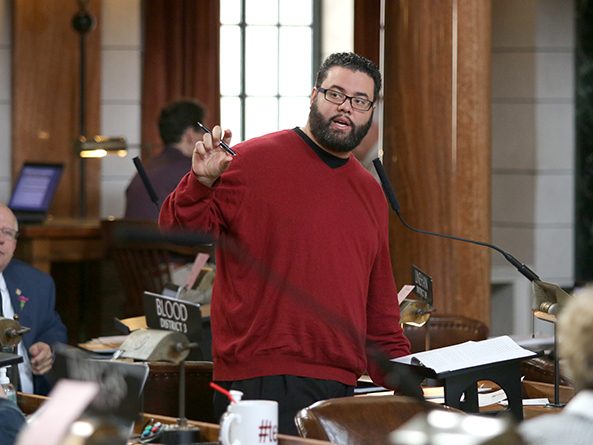Updates to TIF rules amended, advanced
Lawmakers amended and advanced a bill from general file Feb. 15 that would update the state’s tax-increment financing rules.

Introduced by the Urban Affairs Committee, LB874 is the result of an interim study to answer questions about the use of TIF that were raised in a 2016 report by the state auditor of public accounts.
Under a segment of the state’s community development law, Nebraska municipalities are able to designate areas as substandard and blighted, allowing them to be redeveloped. When a redevelopment plan is approved, TIF bonds may be issued for the acquisition and improvement of the property. The increased property taxes generated by the improvements are used to pay for the financing of TIF projects.
Omaha Sen. Justin Wayne, chairperson of the committee, said the bill represents a clean-up of the state’s development laws and offers an opportunity to end a “constant drum beat” of proposals in the Legislature regarding TIF that have had a “chilling effect” on economic development.
“We want to provide stability over the next three to four years, to allow our cities and municipalities to develop, while at the same time taking the anti-TIF bills and the pro-TIF bills [and] putting them together to make sure we address all their concerns,” Wayne said.
Among other provisions, LB874 would authorize the state auditor to audit a community redevelopment authority whenever the auditor believes it necessary, or when requested to do so by the governing body.
The bill would require that:
• a planning commission hearing be held on a redevelopment plan;
• municipalities conduct a substandard and blighted analysis on whether a redevelopment project meets the requirements and include that analysis in the public hearing notice;
• cost-benefit analyses on TIF projects consider the impact on school districts and be made available to the public;
• if a redevelopment project divides the tax on only a portion of the real property included in the project, the property must be clearly related to the redevelopment project;
• proceeds from the repayment of loans made for TIF projects be deposited in the municipality’s general fund and prohibit those proceeds from being used to establish a revolving loan fund;
• TIF redevelopment contracts include a provision requiring developers to retain copies of all supporting documents associated with the project and provide them to the municipality;
• an annual TIF report on projects be provided to a municipality’s governing body; and
• each municipality that utilizes TIF retain copies of all redevelopment plans, substandard and blighted studies and analyses, cost-benefit analyses and supporting documents associated with the redevelopment plan or any related substandard and blighted declaration.
The bill also would:
• limit reimbursement of costs incurred prior to the approval of a redevelopment project;
• redefine the term redevelopment project to include enhancements to structures in the redevelopment project area that exceed minimum building and design standards in the community and prevent recurrence of substandard and blighted conditions; and
• allow redevelopment projects to include a provision that requires that all property taxes levied on a redevelopment project be paid before such taxes become delinquent to be eligible to receive TIF funds.
An Urban Affairs Committee amendment, adopted 31-0, eliminated a provision requiring that each county and school district be given the opportunity to appoint a non-voting member to a municipality’s community redevelopment authority. The amendment also:
• expands the prohibition on revolving fund loans to clarify that no proceeds from indebtedness incurred for a TIF project could be used;
• clarifies that audits done by a community development authority be paid for by that authority;
• eliminates the requirement that each municipality that utilizes TIF establish a local auditing plan; and
• makes a series of reporting, auditing and notice clarifications.
The amendment incorporated provisions of LB846, introduced by Albion Sen. Tom Briese, which would require findings commonly referred to as the “but/for” test to be documented in writing. The test is meant to ensure that redevelopment would not be feasible and would not have occurred, but for the use of TIF financing, he said, and serves as a protection against erosion of a municipality’s tax base.
“There is a concern—founded or unfounded, depending on your perspective—that this causation and economic feasibility requirement is too often only given lip service,” Briese said, “that someone is simply checking a box.”
Briese said that requiring documentation would encourage proper use of TIF by making sure that there is a record of the rationale for a project.
Sen. Mike Groene of North Platte agreed, saying the but/for provision has been distorted in the past and that placing clearer guidance and parameters on the program would help municipalities determine the proper use of TIF.
“When we use TIF it should be for the purpose of urban renewal,” Groene said. “There are a lot of good fixes in this bill.”
LB874 advanced to select file on a 33-0 vote.


